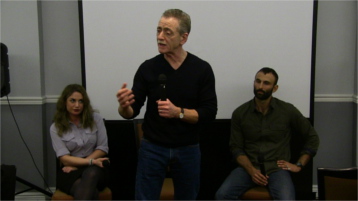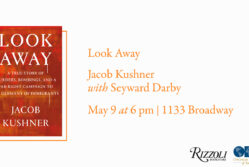Event Coverage Highlight

Freelance Journalists Discuss Industry Challenges After TV Pilot Screening
by Chad Bouchard
Bill Gentile, a veteran journalist and documentary filmmaker who teaches journalism at American University in Washington, DC, has launched a new documentary TV series to explore the lives and challenges of freelance journalists on the front lines around the world.
On Nov. 14, the OPC hosted a special screening of the pilot episode for ‘FREELANCERS,’ which profiled several journalists struggling to make a living. As host of the show, Gentile shadows freelancers in Nogales, Mexico as they cover the dangerous world of drug and human traffickers at the Arizona border. He also talks with a couple that both work as freelancers as they weather the turbulence of a restless lifestyle together, as well as a woman who works on her own and struggles to maintain bonds in her personal life.
After the screening, Gentile moderated a discussion with freelancers Sulome Anderson and Jason Motlagh.
“I think one of the myths that we’re trying to push back on is the idea that Americans don’t want to see foreign news,” Gentile said. “And I don’t believe that. I really do believe that Americans want to see, read, listen to, learn about foreign events, if it’s packaged in the right way.”
A group of journalism students from Rutgers University attended the event. Gentile addressed them directly, telling them to learn as many skills possible.
“Photography, video work, producing, writing – learn all of those skills, because you’re going to need them. They’re in demand, and you’re going to need every skill that you can put to task to survive financially.”
Anderson is a journalist based in Beirut, Lebanon and New York City. While she encouraged students to pursue journalism as a career, she cautioned that changes in the industry have made the business of freelancing much more challenging.
“New organizations have been downsizing foreign bureaus and staff for a long time, but there was still a market. And that has increasingly shrunk,” she said, adding that news operations have become much more cautious and fraught with legal issues after the ISIS killings of James Foley and Steven Sotloff in 2014.
“News organizations reacted to that in several ways. Obviously with more awareness and concern around the safety of freelance correspondents, which is great, and that needs to happen. But what also happened is that they stopped taking these stories. A lot of them just don’t take freelance pitches. To get a freelance pitch through their legal team is an incredibly arduous and difficult process.”
Anderson’s work has appeared in outlets including The Atlantic, Foreign Policy, NBC News, Newsweek, Harper’s and Esquire. Her book, The Hostage’s Daughter, was published by HarperCollins in 2016.
She said many news organizations will now tell freelancers that they will only look at material after they have done the reporting and returned safely home, “which is pretty ethically questionable at the very best.”
Jason Motlagh is a writer, broadcast journalist and filmmaker whose work focuses on conflict and human rights. He won the OPC’s Madeline Dane Ross Award for Best International Reporting on the Human Condition in 2014.
He said the rigors of freelance life in a shrinking market have pushed many veteran reporters out of the game, which leaves room for new freelancers to step in, but at a big cost to the quality of reporting.
“You have really talented people who have put a lot of skin the game for a long time and have risked a lot, who have the credibility and have earned it, and they can’t keep doing it. And then someone else might step into their shoes, but you’ve just lost all that depth of knowledge, and those relationships that really give texture to the reporting.”
Motlagh has reported from more than fifty countries and a half-dozen conflicts spanning West Africa to Southeast Asia for National Geographic, Rolling Stone, Outside, The Washington Post, The Guardian and The Economist.
Both Anderson and Motlagh stressed that they hoped not to talk students out of freelance reporting or a career in journalism, but also wanted to paint a realistic picture.
During the Q&A, photojournalist Ron Haviv, co-founder of the VII Agency, offered a positive counterpoint. He said that “if a photographer is smart, thinking outside the box, finding different approaches, but are not basically repeating what AP, AFP and Reuters are doing, and providing magazines with alternative ways of viewing through their own way of photography or a concept, there’s absolutely work out there, and there’s absolutely ways to survive.”
Click the window below to watch a playlist of video clips from the program.



